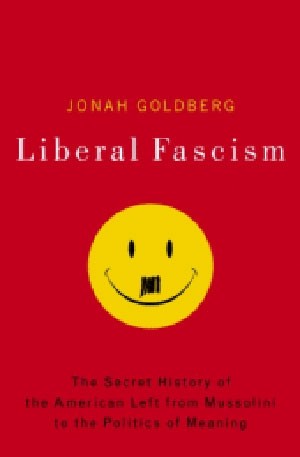Though it’s likely that Americans have never felt less like worshipping a great leader and rallying around the flag, left-wing writers regularly tell us that the Bush administration is turning us into a country of fascists.
Now we have Jonah Goldberg, an editor at the right-wing magazine National Review, who in his book “”Liberal Fascism”” claims not only that contemporary liberals are fascists, but also that historical fascism was a liberal phenomenon (sample chapter title: “”Adolf Hitler: Man of the Left””).
It must be admitted that Goldberg has tackled a worthy subject. The trouble is that Goldberg’s book is very, very stupid.
“”Liberal Fascism: The Secret History of the American Left from Mussolini to the Politics of Meaning””
Jonah Goldbergð ð- Doubleday
List price $16.77 www.amazon.com
…1 star…
Goldberg writes like a man determined to absolve himself in advance of any possible criticism. “”Franklin Roosevelt was no fascist,”” he writes. A few pages later, however, he tells us that “”the New Deal was objectively fascist.”” I suppose the one does not imply the other; still, Goldberg’s lawyerly distinction between the two seems pointlessly pedantic.
Goldberg makes much of the fact that both American progressives and Benito Mussolini lobbied for things such as banning child labor. Goldberg never explains why the idea of banning child labor is fascist, but then he rarely explains why he considers any idea bad; it is sufficient to prove that a bad person believes it. And why is a person bad? Because he or she believes in a fascist idea.
Predictably, Goldberg sees nothing fascistic in, say, the rise of Senator McCarthy. After all, what this country needed was a good mob leader to persecute the liberals. Although, he hastens to imply, McCarthy’s “”mistakes”” were probably due to the fact that the good Wisconsin senator was a little bit of a liberal himself.
I confess to feeling a tinge of excitement as I approached the chapters on the ’60s. Would Goldberg side with Lyndon Johnson, the liberal president who waged ruthless war on Vietnam, or with the liberal kids who protested the war? The answer, of course, is that they were both fascist. What the Vietnam War really needed was a good Republican president – although not Nixon, whom Goldberg also thinks a liberal.
One gets the sense that if Ronald Reagan had not been elected president, Goldberg would have renounced his U.S. citizenship long ago. He seems to cherish nothing about his own country, save the handful of people who agree with him.
Near the end of the book, he even launches into a boring diatribe against liberal Hollywood, as if movie producers were driven by anything but the good, healthy American desire to make money.
Goldberg writes like a man who cannot be bothered to use good grammar because his subject is so obviously pressing. After listing some reasons why Hitler was a liberal (including an interest in “”environmentalism, health food, and exercise””), Goldberg informs us: “”For these reasons, Hitler deserves to be placed firmly on the left because, first and foremost he was a revolutionary.”” Either “”for these reasons”” or “”because”” needs to go. Goldberg also writes that bohemian German kids in the 1920s wrote in a style “”reminiscent of Allen Ginsberg,”” oblivious to the fact that a thing cannot be reminiscent of something that has not happened yet.
Goldberg ends his book with a chapter entitled “”We Are All Fascists Now.”” What he means, of course, is “”You Are All Fascists Now.”” He and his buddies remain morally virtuous, always.









